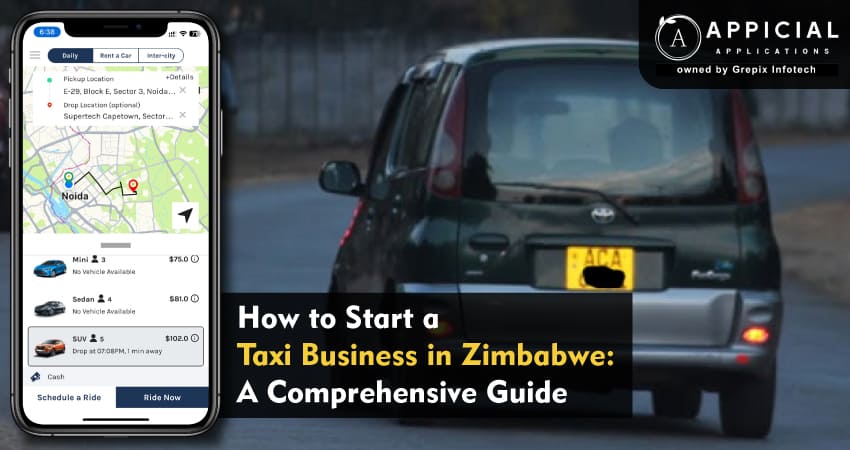
How to Start a Taxi Business in Zimbabwe: A Comprehensive Guide
Starting a taxi business in Zimbabwe requires careful planning, adherence to regulations, and a commitment to quality service. By following the steps outlined in this guide, you can create a sustainable and profitable business that meets the needs of Zimbabwean commuters. Remember, success in this competitive industry hinges on your ability to adapt, innovate, and consistently deliver exceptional service.
Launching a taxi business in Zimbabwe is a lucrative opportunity for entrepreneurs looking to tap into the growing demand for reliable transportation services. With urbanization on the rise and increasing dependence on taxis for daily commutes, launching a taxi service can be rewarding and challenging. In this guide, we’ll walk you through the essential steps to establish a successful taxi business in Zimbabwe.
Starting a taxi business in Zimbabwe is a lucrative opportunity due to the growing demand for reliable transportation services. Success requires careful planning, market research, and adherence to regulations. Entrepreneurs must focus on offering quality service, hiring skilled drivers, and leveraging technology like ride-hailing apps and GPS systems to streamline operations. A solid business plan, competitive pricing, and effective marketing are key to building a strong customer base. Partnering with a trusted taxi app development company like Appicial Applications can provide the tools needed to thrive in Zimbabwe’s dynamic transportation sector, ensuring customer satisfaction and sustainable business growth.
Understanding the Taxi Business Landscape in Zimbabwe
Zimbabwe’s transportation sector is highly dynamic, with significant demand for affordable and convenient services. Urban areas like Harare, Bulawayo, and Mutare have seen a steady increase in traffic congestion, making taxis an ideal alternative to personal vehicles. The industry, however, is competitive and regulated, requiring strategic planning and compliance with government laws.
1Conduct Market Research
Before diving in, it’s crucial to conduct thorough market research. Understanding the specific needs of your target audience, the types of services in demand, and the competition will give you a competitive edge.
- Analyze the demand: Are people looking for ride-hailing services, traditional metered taxis, or shared taxis?
- Identify competitors: Study existing operators, pricing models, and service areas.
- Evaluate locations: Urban areas often provide more opportunities compared to rural areas.
- Customer preferences: Find out what customers value the most, such as affordability, convenience, or reliability.
2 Develop a Solid Business Plan
A well-drafted business plan is your roadmap to success. It not only provides direction but also helps attract investors or secure funding.
- Define your services: Decide whether you will operate as a conventional taxi service, a ride-hailing app, or a mix of both.
- Set financial goals: Include estimates of initial investment, operational costs, and expected revenue.
- Outline growth strategies: How will you expand your fleet or attract more customers over time?
- Create a marketing plan: Detail how you promote your business and attract clients.
3 Legal and Regulatory Compliance
Compliance with Zimbabwe’s transportation laws is non-negotiable. The government has strict regulations for the taxi industry to ensure safety and quality service.
- Register your business: Obtain a business license from the Zimbabwe Revenue Authority (ZIMRA).
- Acquire permits: You’ll need taxi operator permits from the Ministry of Transport and Infrastructure Development.
- Vehicle inspections: Ensure all vehicles meet roadworthiness standards as required by law.
- Insurance: Purchase comprehensive insurance for your vehicles and public liability insurance for passenger safety.
4 Secure Capital and Invest in Vehicles
Starting a taxi business requires significant investment. You’ll need capital for purchasing vehicles, branding, permits, and marketing.
- Purchase vehicles: Invest in fuel-efficient, durable cars suitable for Zimbabwean roads. Popular models include the Toyota Corolla and Honda Fit.
- Consider leasing: If buying multiple vehicles isn’t feasible initially, leasing may be a cost-effective alternative.
- Explore funding options: Consider personal savings, bank loans, or partnerships to raise the necessary funds.
5 Hire and Train Drivers
Your drivers are the face of your business, so hiring qualified, customer-friendly professionals is essential.
- Recruitment: Hire drivers with valid driver’s licenses and clean criminal records.
- Training: Provide training on customer service, road safety, and handling emergencies.
- Contracts: Draft clear employment contracts outlining responsibilities and remuneration.
6 Establish an Effective Pricing Strategy
Competitive pricing is a cornerstone of a successful taxi business. Research the average rates in your area and create a pricing model that attracts customers while ensuring profitability.
- Set base fares: Determine your minimum charge for each ride.
- Adjust for peak hours: Introduce dynamic pricing during high-demand periods.
- Offer discounts: Launch promotions or loyalty programs to build a steady customer base.
7 Develop a Marketing and Branding Plan
A strong brand and effective marketing can set your taxi business apart from competitors.
- Create a brand identity: Develop a catchy name, logo, and tagline that resonates with your target audience.
- Leverage online platforms: Build a website and use social media to promote your services.
- Partnerships: Collaborate with local businesses like hotels, airports, and schools for steady customer referrals.
Also Read: Driving to Success: How to Become a Billionaire in Saudi Arabia's Taxi Business
8 Leverage Technology
Technology plays a pivotal role in modern taxi businesses. Implementing tech-driven solutions can enhance customer experience and streamline operations.
- Mobile apps: Develop an app for ride bookings and payments.
- GPS tracking: Equip vehicles with GPS for accurate navigation and improved safety.
- Payment options: Offer cashless payment methods such as mobile money or credit cards.
9 Ensure Quality Service
The success of your taxi business largely depends on customer satisfaction. Focus on delivering consistent and high-quality service to build a loyal customer base.
- Timeliness: Ensure drivers adhere to schedules and avoid delays.
- Cleanliness: Maintain clean vehicles to create a positive impression.
- Feedback: Actively seek and address customer feedback to improve services.
10 Scale Your Business
Once your taxi business gains traction, focus on scaling your operations to increase profitability.
- Expand your fleet: Add more vehicles to cater to growing demand.
- Diversify services: Consider adding premium taxi options, airport shuttles, or corporate transport.
- Franchise model: Explore franchising opportunities to grow your brand in other cities.
Conclusion
Starting a taxi business in Zimbabwe is a promising venture with significant growth potential. By following the outlined steps conducting market research, adhering to regulations, and leveraging technology you can build a successful and customer-focused operation.
Partnering with Appicial Applications, a leading taxi app development company, can give your business a competitive edge. Appicial offers tailored solutions like user-friendly ride-hailing apps, GPS integration, and secure digital payment systems, enabling seamless operations and customer satisfaction. With Appicial's expertise and dedication, you can establish a thriving taxi service in Zimbabwe’s dynamic transportation sector and stand out in the competitive market.
FAQs
Looking out to start your own venture like Uber in Zimbabwe ? Try out our HireMe Taxi Uber Clone, the easiest way to kick-start your taxi business.
Author's Bio

Saleem Ahmed is a skilled digital marketer at Grepix Infotech, known for executing data-driven strategies that boost online visibility. His expertise consistently drives engagement and lead generation across digital platforms.
Back to blog list




